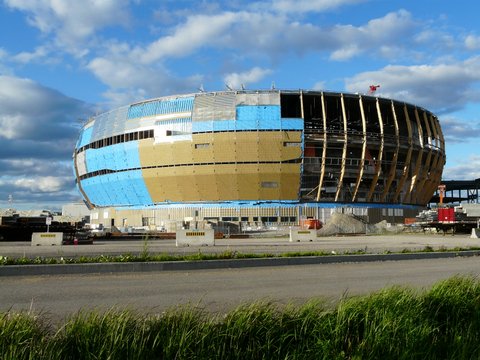Like this article? Chip in to keep stories like these coming.
![]()
The National Hockey League’s Ottawa Senators want to abandon the club’s 20-year-old arena in the suburb of Kanata and rebuild near the city’s downtown. Although the team says that fans don’t want to travel to the edge of town to watch their team, the arena actually draws an average of 96 percent of its capacity for home games. Still, the club’s president, Cyril Leeder, says that the Senators would need support from the city before proceeding with their plan. Almost certainly, that’s coded language foreshadowing a request for tens or even hundreds of millions of dollars in public money to build an arena. There, millionaire players employed by multi-millionaire owners would play before people who can afford to pay $7,700 for a season’s ticket in a good seat.
The Senator’s plan fits an all too familiar pattern. More recently, Edmonton paid half the cost of a new $480-million arena after the team owner threatened to move the NHL’s Oilers if the city did not pony up. At least Edmonton has a team. Quebec City and the province are splitting the cost of their $400-million arena in the faint hope of luring an NHL team to the city, replacing the Nordiques who decamped to Colorado in 1995. What’s more, Montreal Mayor Denis Coderre appears prepared to spend whatever it takes to attract a Major League Baseball team to replace the Expos, who left in 2004.
Barrie McKenna, a business writer for The Globe and Mail, says that all of these projects are bad investments and a poor use of public money. There are numerous studies to prove his point, and McKenna, himself, cites one prepared by the Federal Reserve Bank of St. Louis. The bank’s authors say: “The weight of economic evidence shows that taxpayers spend a lot of money and ultimately don’t get much back. And when this paltry return is compared with other potential uses of the funds, the investment, almost always, seems unwise.”
In Ottawa, for example, there has been talk for years about replacing the city’s 40-year-old public library. The cost would be about $86 million, but city councillors have consistently pleaded poverty. Still, they will likely be asked for even more money when the arena consortium comes knocking.
Of course, the federal Conservatives haven’t contributed to the Quebec City arena yet. Nevertheless, Luc Paradis, president of the Quebec City Chamber of Commerce, has told the press that “it would be political suicide if they don’t.” The Conservatives, after all, hold only five of the 76 federal seats in Quebec — all of them in the Quebec City region. The party has already mused about funnelling money normally targeted for basic infrastructure projects, such as roads and bridges, to be spent on arenas.
Business interests and boosters in the media can place acute pressure on politicians — those who are far too often willing to be convinced. But using public money to build sports palaces? Well, that remains a demonstrably bad idea.
This piece was carried as a blog in the United Church Observer on August 13, 2015.



